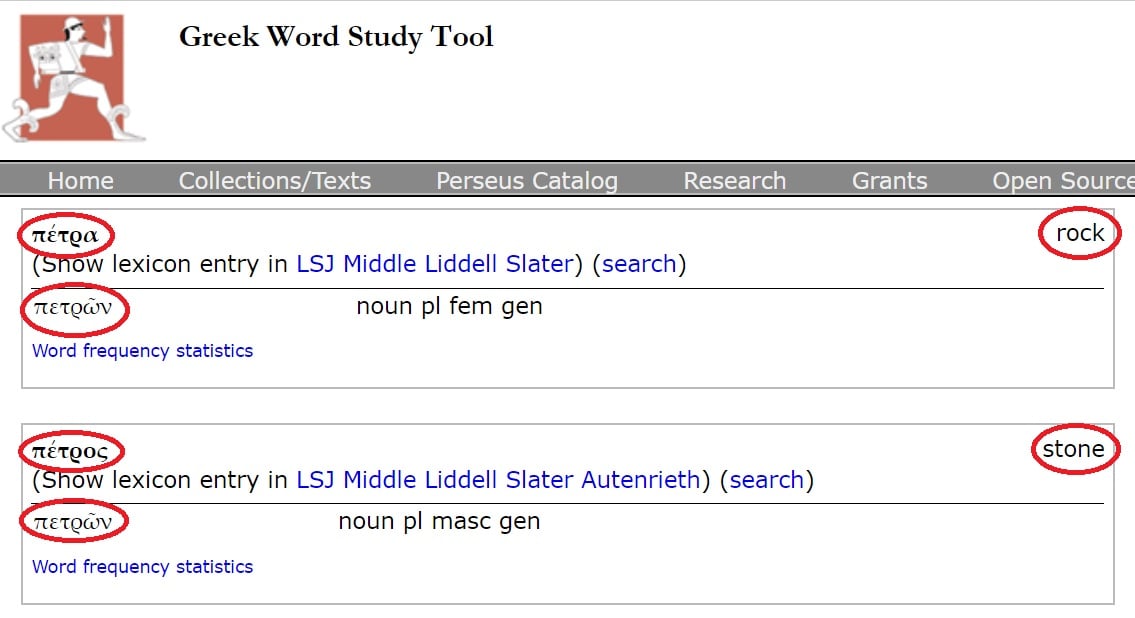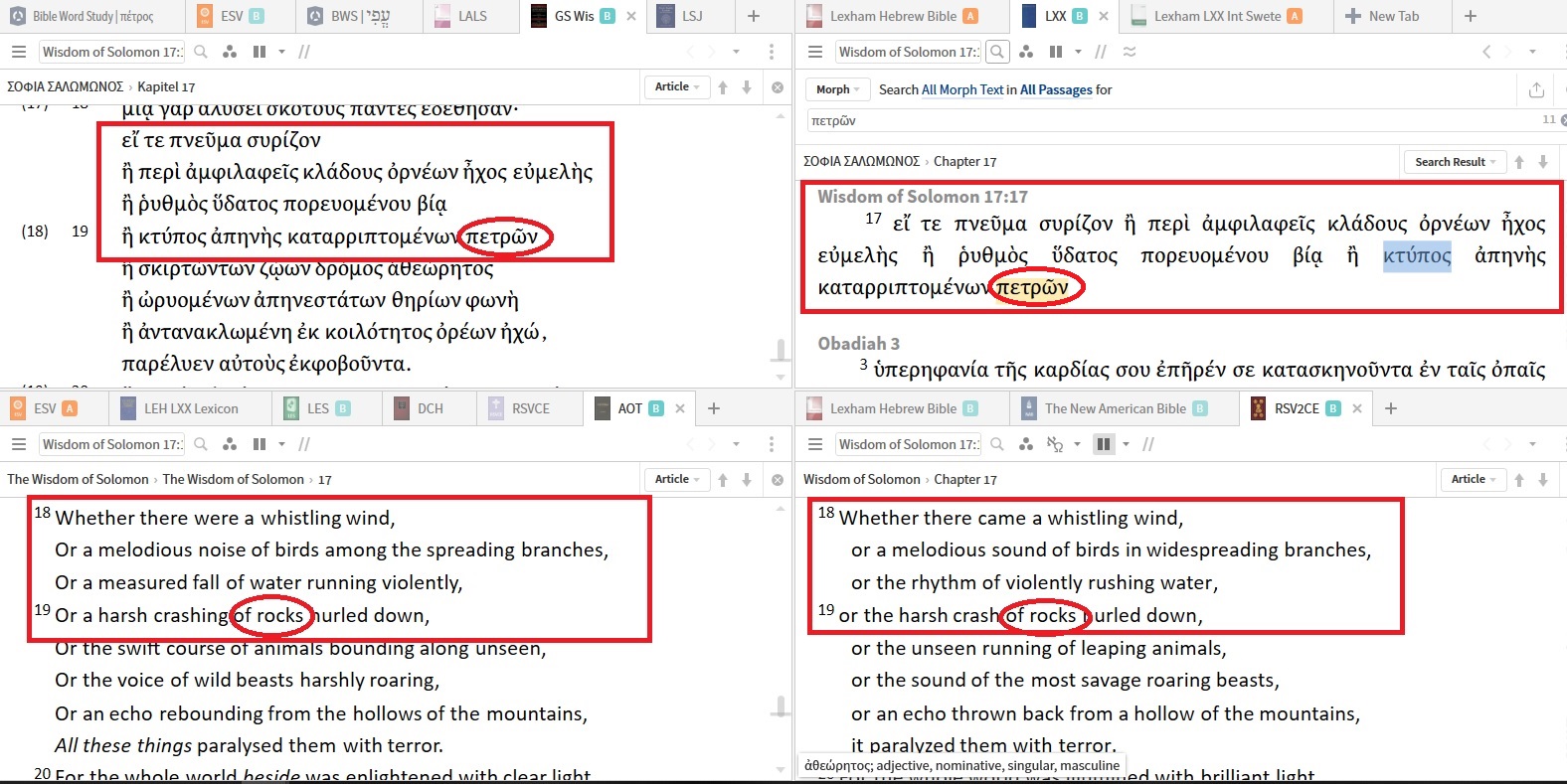Mistake in tagging of the Greek form “πετρῶν” in the Septuagint
The Greek form “πετρῶν” in the Septuagint is tagged as “πέτρος” (lemma):
The form “πετρῶν” is the plural genitive of two Greek nouns: the masculine “πέτρος” (stone), and the feminine “πέτρα” (rock):
Based on the form of the word alone, you cannot say if the “πετρῶν” is pl fem gen of “πέτρα” or pl masc gen of “πέτρος.”
For some reasons, the Faithlife team has decided to tag all the instances of the form “πετρῶν” present in the LXX as “πέτρος” (lemma). In my opinion, in most cases this is a clear mistake, because as a result, you receive this Word Study report for the lemma:
The Greek word “πέτρος” means „stone”, but according to this WS report, all but one Hebrew words to which the “πέτρος” is the corresponding word in the LXX, mean “rock.” And even in one exceptional instance, the Hebrew word doesn't mean “stone”, but “thick foliage.”
The form “πετρῶν” appears 11 times the Greek OT. The biblical references for the “Septuaginta: Morphologically Tagged Edition” are listed below (they can differ in other Bible editions):
- Ps 103:12;
- Job 30:6;
- Wisdom of Solomon 17:17;
- Obadiah 3;
- Isa 2:19;
- Isa 2:21;
- Isa 7:19;
- Isa 57:5;
- Jer 16:16;
- Jer 30:10;
- Jer 28:25.
Because the “πετρῶν” may refer either to “πέτρα” or to “πέτρος,” you have to look at the context in order to be able to recognize the lemma behind the form “πετρῶν,” as for instance:
The lemma given for “πετρῶν” is “stone,” but on the basis of the context, it is translated: “(in the) rocks.”
Note here: The Bible references differ in diverse Bible editions.
In my opinion, for Jer 30:10 and most of the cases, the context is clear enough, and it points to “πέτρα” as the lemma (and it is so translated by Lancelot Charles Lee Brenton):
Obadiah 3 (LXX)
3 ὑπερηφανία τῆς καρδίας σου ἐπῆρέν σε κατασκηνοῦντα ἐν ταῖς ὀπαῖς τῶν πετρῶν, ὑψῶν κατοικίαν αὐτοῦ λέγων ἐν καρδίᾳ αὐτοῦ Τίς με κατάξει ἐπὶ τὴν γῆν;
Obadiah 3 (Brenton LXX En)
3 Behold, I have made thee small among the Gentiles: thou art greatly dishonoured. The pride of thine heart has elated thee, dwelling as thou dost in the holes of the rocks, as one that exalts his habitation, saying in his heart, Who will bring me down to the ground?
Isaiah 2:19 (LXX)
19 εἰσενέγκαντες εἰς τὰ σπήλαια καὶ εἰς τὰς σχισμὰς τῶν πετρῶν καὶ εἰς τὰς τρώγλας τῆς γῆς ἀπὸ προσώπου τοῦ φόβου κυρίου καὶ ἀπὸ τῆς δόξης τῆς ἰσχύος αὐτοῦ, ὅταν ἀναστῇ θραῦσαι τὴν γῆν.
Isaiah 2:19 (Brenton LXX En)
19 having carried them into the caves, and into the clefts of the rocks, and into the caverns of the earth, for fear of the Lord, and by reason of the glory of his might, when he shall arise to strike terribly the earth.
Isaiah 2:21 (LXX)
21 τοῦ εἰσελθεῖν εἰς τὰς τρώγλας τῆς στερεᾶς πέτρας καὶ εἰς τὰς σχισμὰς τῶν πετρῶν ἀπὸ προσώπου τοῦ φόβου κυρίου καὶ ἀπὸ τῆς δόξης τῆς ἰσχύος αὐτοῦ, ὅταν ἀναστῇ θραῦσαι τὴν γῆν.
Isaiah 2:21 (Brenton LXX En)
21 to enter into the caverns of the solid rock, and into the clefts of the rocks, for fear of the Lord, and by reason of the glory of his might, when he shall arise to strike terribly the earth.
Isaiah 7:19 (LXX)
19 καὶ ἐλεύσονται πάντες καὶ ἀναπαύσονται ἐν ταῖς φάραγξι τῆς χώρας καὶ ἐν ταῖς τρώγλαις τῶν πετρῶν καὶ εἰς τὰ σπήλαια καὶ εἰς πᾶσαν ῥαγάδα καὶ ἐν παντὶ ξύλῳ.
Isaiah 7:19 (Brenton LXX En)
19 And they all shall enter into the clefts of the land, and into the holes of the rocks, and into the caves, and into every ravine.
Isaiah 57:5 (LXX)
5 οἱ παρακαλοῦντες ἐπὶ τὰ εἴδωλα ὑπὸ δένδρα δασέα, σφάζοντες τὰ τέκνα αὐτῶν ἐν ταῖς φάραγξιν ἀνὰ μέσον τῶν πετρῶν.
Isaiah 57:5 (Brenton LXX En)
5 who call upon idols under the leafy trees, slaying your children in the valleys among the rocks?
Jeremiah 28:25 (LXX)
25 ἰδοὺ ἐγὼ πρὸς σέ, τὸ ὄρος τὸ διεφθαρμένον τὸ διαφθεῖρον πᾶσαν τὴν γῆν, καὶ ἐκτενῶ τὴν χεῖρά μου ἐπὶ σὲ καὶ κατακυλιῶ σε ἀπὸ τῶν πετρῶν καὶ δώσω σε ὡς ὄρος ἐμπεπυρισμένον,
Jeremiah 28:25 (Brenton LXX En)
25 Behold, I am against thee, the ruined mountain, that destroys the whole earth; and I will stretch out mine hand upon thee, and will roll thee down upon the rocks, and will make thee as a burnt mountain.
Jeremiah 30:10 (LXX)
10 ἡ παιγνία σου ἐνεχείρησέν σοι, ἰταμία καρδίας σου κατέλυσεν τρυμαλιὰς πετρῶν, συνέλαβεν ἰσχὺν βουνοῦ ὑψηλοῦ, ὅτι ὕψωσεν ὥσπερ ἀετὸς νοσσιὰν αὐτοῦ, ἐκεῖθεν καθελῶ σε.
Jeremiah 29:16 (Brenton LXX En)
16 Thine insolence has risen up against thee, the fierceness of thine heart has burst the holes of the rocks, it has seized upon the strength of a lofty hill; for as an eagle he set his nest on high: thence will I bring thee down.
Job 30:6 (LXX)
6 ὧν οἱ οἶκοι αὐτῶν ἦσαν τρῶγλαι πετρῶν,
Job 30:6 (Brenton LXX En)
6 whose houses were the caves of the rocks, who lived under the wild shrubs.
Psalm 103:12 (LXX)
12 ἐπʼ αὐτὰ τὰ πετεινὰ τοῦ οὐρανοῦ κατασκηνώσει, ἐκ μέσου τῶν πετρῶν δώσουσιν φωνήν.
Psalm 103:12 (Brenton LXX En)
12 By them shall the birds of the sky lodge: they shall utter a voice out of the midst of the rocks.
For the “πετρῶν” in the Wisdom of Solomon 17:17, it could be translated either way: “stones” or “rocks”, as it is depicted above. But I would rather be inclined to choose the meaning “rocks,” because of the context of the OT, especially the two verses below where a bird (dove) appears in connection with the rocks:
Song of Solomon 2:14 (LXX)
14 καὶ ἐλθὲ σύ, περιστερά μου ἐν σκέπῃ τῆς πέτρας ἐχόμενα τοῦ προτειχίσματος, δεῖξόν μοι τὴν ὄψιν σου καὶ ἀκούτισόν με τὴν φωνήν σου, ὅτι ἡ φωνή σου ἡδεῖα, καὶ ἡ ὄψις σου ὡραία.
Song of Solomon 2:14 (Brenton LXX En)
14 Thou art my dove, in the shelter of the rock, near the wall: shew me thy face, and cause me to hear thy voice; for thy voice is sweet, and thy countenance is beautiful.
and:
Jeremiah 31:28 (LXX)
28 κατέλιπον τὰς πόλεις καὶ ᾤκησαν ἐν πέτραις οἱ κατοικοῦντες Μωαβ, ἐγενήθησαν ὡς περιστεραὶ νοσσεύουσαι ἐν πέτραις στόματι βοθύνου.
Jeremiah 31:28 (Brenton LXX En)
28 The inhabitants of Moab have left the cities, and dwelt in rocks; they have become as doves nestling in rocks, at the mouth of a cave.
Conclusion: In my opinion, in all the above verses, the word “πετρῶν” means “rocks” and derives from the lemma “πέτρα.” It is my suggestion to change the tagging (lemma) of this form in all the instances in the LXX, from “πέτρος” to “πέτρα.”
Comments
-
Great work!
looks pretty convincing to this beginner-level Greek student. But you know what Proverbs has to say about that.... Would be interesting to see what @Sean Boisen, @Mark Ward or @Rick Brannan reply to this.
You may want to send an email to revint@logos.com and alert the right people to this thread (unless someone drops by, e.g. monitoring the forums for L8-related things, and stumbles over here)
Have joy in the Lord!
 0
0 -
Thank you for a good word and this suggestion. I did it.NB.Mick said:You may want to send an email to revint@logos.com and alert...
0 -
Thanks for the detailed report; I've passed it along to the data team.
0 -
One thing to add: the resource you show in your screenshot is obsolete and will not get any fixes/improvements. Please follow my recommendation here to switch to an alternate LXX text: https://community.logos.com/forums/p/62682/442248.aspx#442248
0 -
One thing to add: the resource you show in your screenshot is obsolete and will not get any fixes/improvements. Please follow my recommendation here to switch to an alternate LXX text: https://community.logos.com/forums/p/62682/442248.aspx#442248
Bradley, I apologize if this is a dumb question, but is there a tag that identifies resources that are obsolete and no longer being maintained?
If not, I'd like to suggest that adding a "deprecated" tag to those resources would be very helpful for users. There might still good reasons to use those older resources - for instance, when they're referenced by other works - but we'd know to avoid them for new research.
0 -
EastTN said:
I apologize if this is a dumb question, but is there a tag that identifies resources that are obsolete and no longer being maintained?
If not, I'd like to suggest that adding a "deprecated" tag to those resources would be very helpful for users.
Not Bradley, but I think that's a valid suggestion (people did the same with the deprecated BHS resources some time back). If a number of users - maybe as low as 5 - uses the same tag on a resource, then it will show up as a community tag in the library for all users
Have joy in the Lord!
 0
0 -
I would be happy to be one of those 5 users if I knew which tag to use, and which resources to tag.
0 -
There isn't an official way to mark deprecated resources but you can tag any of these that you own (NOTE: make sure you're tagging the right resource ID; some have very similar titles):
- LLS:1.0.197
- LLS:1.0.200
- LLS:1.0.201
- LLS:1.0.202
- LLS:1.0.203
- LLS:1.0.301
- LLS:BHSSESB2
0 -
Thank you, Bradley. (I do think this would be a useful feature to build into a future version.)
0





